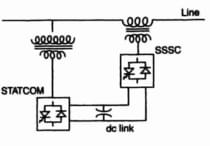1. The maximum tension in a section of overhead line conductor between two supports of unequal height occurs at_______.
a. The higher support
b. The lower point
c. The midpoint of the conductor
d. None of the above
2. Stringing chart is useful______.
a. For finding the sag in the conductor
b. In the design of tower
c. In the design of insulator string
d. Finding the distance between towers
3. Hot template curves are plots of_________.
a. Temperature and humidity
b. Conductor sag and span lengths
c. Conductor weight and sag
d. None of the above
4. The effect of wind pressure is more predominant on_________.
a. Insulators
b. Transmission lines
c. Supporting towers
d. None of the above
5. Galloping in transmission line conductors arises due to________.
a. Asymmetrical layers of ice formation
b. Vortex phenomenon in light winds
c. Heavy weight of the line conductors
d. Adoption of horizontal conductor configuration
6. Which of the following is reduced by using stock bridge dampers on power overhead transmission lines ?
a. Sag
b. Conductor vibration
c. Line losses
d. Mechanical tension
7. The sag of the conductors of a transmission line is 2.5 m when the span is 250 m. Now if the height of supporting tower is increased by 25%, the sag will__________.
a. Reduce by 25%
b. Increase by 25%
c. Reduce by 12.5%
d. Remain Unchanged
a. 8m
b. 11m
c. 3n(n+1)+1
d. 2n(n+1)+1
10. The diameter of each strand is d then the diameter of n-layer stranded conductor will be_______.
a. (2n+1)d
b. 3(n+1)d
c. (2n-1)d
d. 3(n-1)d
11. Strain type insulators are used______.
a. At dead ends
b. At intermediate anchor towers
c. on straight runs
d. any of (a) or (b)
c. Flash-over voltage
d. Thermal strength
13. Which type of insulator is used on 132 kV transmission lines ?
a. Pin type
b. Disc type
c. Shackle type
d. Pin and Shackle type
14. Whenever the conductor are dead-ended or there is a change in the direction of transmission line, the insulators used are of the________.
a. Pin type
b. Suspension type
c. Strain type
d. Shackle type
15. Post type insulators are generally used in lines operating_________.
a. Above 100 kV
b. Below 33 kV
c. At any voltage level, hv or ehv
b. 22 to 23
c. 15 to 16
c. The existence of stray
capacitance between the metallic junctions of the units and the tower body
d. Non-uniform distance between the cross-arms and the units
18. The voltages across the various discs of a string of suspension insulators having identical discs is different due to__________.
a. Surface leakage currents
b. Series capacitance
c. Shunt capacitance to ground
d. Series and Shunt capacitances
19. The string efficiency of a string of suspension insulators is dependent on_________.
a. Size of the insulators
b. Number of discs in the
string
c. Size of tower
20. 100 percent string efficiency means_______.
a. One of the insulator discs shorted
b. Zero potential across each disc
c. Equal potential across each
insulator disc
d. None of the above
21. In a suspension type insulator the potential drop is________.
a. Maximum across the lowest disc
b. Maximum across the topmost
disc
c. Uniformly distributed over the discs
22. If the frequency of a transmission system is changed from 50 Hz to 100 Hz, the string efficiency_________.
a. Will increase
b. Will decrease
c. May increase or decrease depending on the line parameters
d. Remain unchanged
23. The string efficiency of a high-voltage line is around________.
a. 100%
b. 80%
c. 40%
d. 10%
24. In three-unit insulator string, voltage across the lowest unit is 17.5 kV and string efficiency is 84.28%. The total voltage across the string will be equal to________.
a. 8.285 kV
b. 44.25 kV
c. 88.25 kV
d. 442.5 kV
25. Two-insulator discs of identical capacitance value C makes up a string for a 22 kV, 50 Hz, single-phase overhead line insulation system. If the pin to earth capacitance is also C, then the string efficiency is________.
a. 50%
b. 75%
c. 86%
d. 90%
Transmission and distribution line MCQ Part-1
Transmission and Distribution line MCQ Part-2
Transmission and Distribution line MCQ Part-4
Transmission and Distribution line MCQ Part-5






0 Comments
If you have any doubt, feel free to ask.